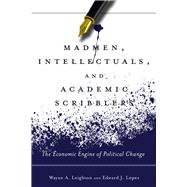- ISBN: 9780804780971 | 0804780978
- Cover: Hardcover
- Copyright: 11/21/2012
Madmen, Intellectuals, and Academic Scribblersoffers up a simple, economic framework for understanding the systematic causes of political change. In order to distill the smorgasbord of scholarship on political evolution, Madmentakes up three fundamental, interrelated questions: Why do democracies generate policies that impose net costs on society? Why do such policies persist over long periods of time, even though they may be widely known to be socially wasteful and even though better alternatives could be implemented? And why do certain wasteful policies eventually get repealed (e.g., airline rate and route regulation), while others endure (e.g., sugar subsidies and tariffs)? Authors Wayne A. Leighton and Edward J. Lopez examine these questions through familiar policies in contemporary American politics, but also to draw on examples from around the world and throughout history to paint a lively picture and illustrate the pervasiveness of these quandaries. Working with the basic assumption that incentives determine people's decisions, they match up three key ingredients--ideas, rules, and incentives--with the characters who make political waves--madmen (such as Friedrich Hayek and John Maynard Keynes), intellectuals (like Jon Stewart and George Will), and academic scribblers(in the vein of Franklin Delano Roosevelt and Margaret Thatcher). Ultimately, Madmenfinds that political change happens when these characters notice loose spots in the structure of ideas, institutions, and incentives, and then act as entrepreneurs who find ways of implementing change in society's institutions. The entrepreneurs in political change may be philosophers, opinion makers, political leaders, or other types of influencers. What they have in common is an interest in better ideas--ones that improve the human condition--and that impact incentives and outcomes.






